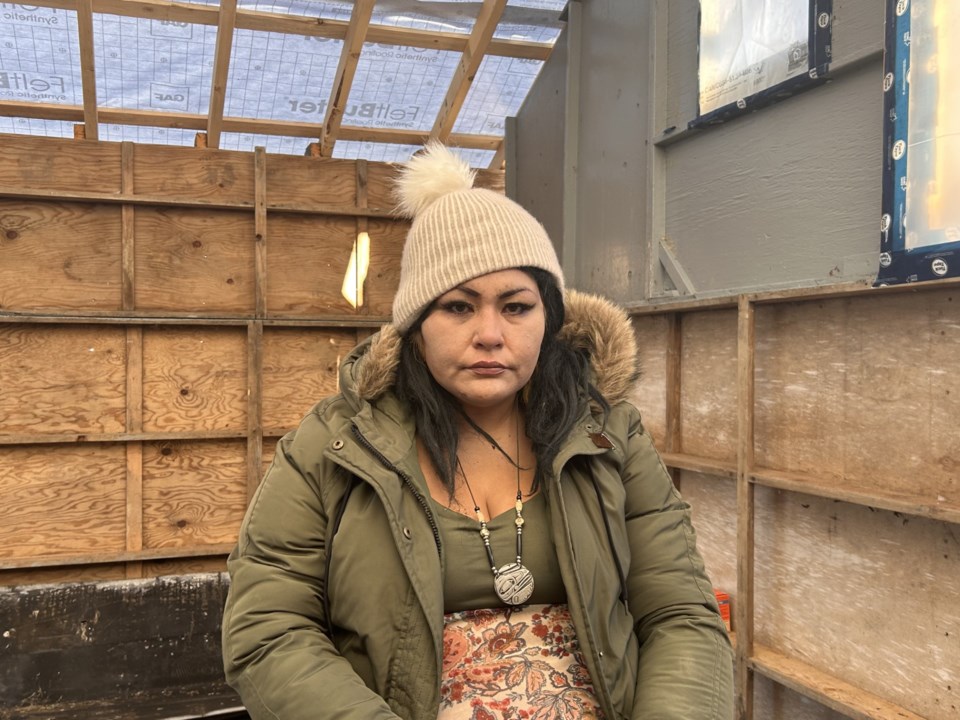Danielle Willier doesn’t want to be back living in Moccasin Flats, but she has nowhere else to go.
She has PTSD about being in Moccasin Flats, because in the summer of 2021 she was shot in the shoulder while staying at the encampment.
She had moved to Millennium Park, where she felt safer, until the city issued an eviction notice and dismantled that encampment and she now finds herself back at the Flats.
“It’s been hard trying to find a place. I had a phone for awhile, but it’s been stolen,” said Willier.
“I’ve been trying to get housing and been trying to get clean, but it’s been hard without a phone or a stable place to go. Always having to worry about your stuff being stolen. I have had everything I owned stolen from me three times.”
Since being shot, she doesn’t have full use of her arm and will need surgery to repair it, which she says makes being out on the street even harder.
Willier is in her mid-30s and for years she worked as a cook until she fell on hard times. She’s from Takla First Nation but was raised by her grandparents who are Cree originally from High Prairie, Alberta.
“I have been in and out of foster homes since I was a kid,” said Willier. “My dad was in residential schools, and my mom had a massive stroke, so she had to learn how to read, write, talk and everything over again and that really broke up our family.”
Willier said she has lost a lot of people in her life including her close friends, her grandparents and three of her sisters.
“My eldest sister Wanda, she also took care of us when we were kids, she was sober for four years and then she relapsed,” said Willier, adding that her sister overdosed and died in her arms.
“She was my role model. She did everything for everyone. She would make money by making dream catchers all year and sell them, and she would use the proceeds to buy blankets and mittens for people living on the street.”
Willier said it has been really hard for her to cope since she lost Wanda nearly a year ago and feels like she hasn’t had any time to grieve.
“A lot of our parents have been in residential schools and suffered so many sexual assaults and abuse and they carry that with them and then in turn don’t teach us. They don’t know how because they haven’t dealt with their own traumas themselves,” said Willier.
“I think there should be more counselling instead of more prisons. More healing and building back our culture because we are slowly losing our culture, our language, our spirituality, our medicines. We are losing it all. It’s really sad.”
Willier said she has been unhoused for over three years now, and has been sexually assaulted twice in that time.
She said her biggest hope is to have somewhere she can lay her head and be stable, where she doesn’t have to worry about her things being taken.
“I grew up in this town and it has just changed for the worst. Nobody wants us. They don’t know who we are and they just judge us,” she said.
“There are some good people out here, you know. We are not all the worst of the worst. But there’s some people that drive around telling us to go and get jobs. I’d love for them to live one week in our shoes and come from where we’ve come from.”
Willier said she wants the stigma towards people living on the street and in encampments to stop.
“It’s not like I ever chose this life. I can’t help what I am born into, you know,” she said.
“I bet if there was more housing the crime rate would go down. It would be that simple if we had our own homes. Not struggling to gather things just to stay warm.”
This is the third instalment in a series of features the Prince George Citizen will be doing to chronicle the stories of unhoused individuals within the city. If you know someone who would like to share their story please contact [email protected].




.png;w=120;h=80;mode=crop)
